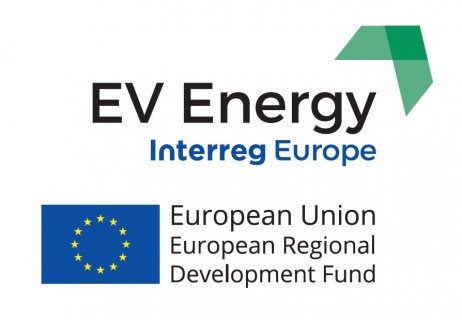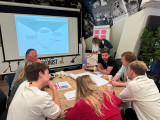EV Energy paves the way for a future decarbonisation of the energy and mobility sector.
Articles by Green IT Amsterdam
- Removing the last hurdle to EV’s integration: policies and regulations overdue make-over
- Embracing the flexible energy revolution in urban cities
- EV ENERGY at the European Sustainable Energy Week
- Nieuwe mobiliteitsoplossingen vereisen slimme ICT / New mobility solutions require smarter ICT
- Opslag van energie Amsterdam Arena wijst datacenters de weg
Professionals Video
- RTL7 - Green Project (Dutch TV - We explain how your electric car can function as a small power plant!)
- EV Energy takes action! (Video on the actions planned in our partner regions to promote sustainable mobility and energy)
Newsletter: Semester 1, Semester 2, Semester 3, Semester 4,
Other materials:
Subscribe to our newsletter and receive upfront all news, updates and events from the EV ENERGY project !
What is the goal of the project?
Cities are the main energy consumers, but also offer the greatest opportunities for change. Two of the most important technologies that are gaining momentum in European cities are electric vehicles (EVs) and renewable energies. Both technologies offer great potential for climate change mitigation but do come with limitations. European cities are advancing at rapid pace in the field of renewable energies and urban electric mobility. These are innovative and smart technologies that can contribute significantly to reducing greenhouse gas emissions and increase energy efficiency. Their intelligent integration into energy and mobility system is of high priority in our urban ecosystem.
The EV Energy project aims to analyse, initiate and implement policies favouring sustainable energy and electric mobility systems in urban areas. It works with experienced cities and regions, transferring the most appropriate policies and actions. We are preparing the transition from fossil-driven energy towards fair priced, decarbonised, clean and integrated resources and electric mobility systems.
What is the result of the project?
The EV Energy will produce various outcomes, both on policy and good practices level. The contextualisation of good practices to enhance knowledge transfer between the regions of our consortium will be executed as well as criteria for replicability in other regions. We are going to improve local and regional policies, based on key outputs and experiences we will gain. Moreover, transferrable insights through relevant action plans for renewable energy and electric mobility systems will be monitored during the second phase of the project. All these results will highly benefit the cities and thanks to our transferrable knowledge and good practices, other cities will have the opportunity to implement our action plans.
Who initiated the project and which organizations are involved?
Green IT Amsterdam initiated the project following a previous successful project called Green IT Network where the goal was to enable a powerful inventory of smart IT good practices. The next step was to use this outcome to go further.
Partners of our consortium are
1- Green IT Amsterdam (Netherlands, Lead Partner), a non-profit organisation enabling the energy transition within the region of Amsterdam by scouting, testing and showcasing innovative green IT solutions;
2- Province of Flevoland (Netherlands), a public organisation responsible for the regional development of the region of Flevoland, including the integration of sustainable energy and mobility into the regional economy;
3- Barcelona Chamber of Commerce, Industry, Services and Navigation (Spain) promotes economic and business activity, improving SME competitiveness, international and regional development;
4- Stockholm County Council, Growth and regional planning administration (Sweden) is part of the Stockholm County Council and its responsible for regional planning, which comprises 26 municipalities;
5- Kaunas University of Technology (Lithuania) hosts the Institute of Environmental Engineering is a research unit of KTU and it’s the largest technical university in the Baltic;
6- Regional Association of Lazio Municipalities (Italy) promotes and debates EU policies in several fields among its 378 associated members;
7- EUR S.p.A (Italy) is a publicly owned Italian real estate company which manages buildings of rare value among them a large heritage of works from the Rationalist period.
What is the next step?
The current phase 1 (January 2017 - June 2019) of our project is to scout and analyse the policies and good practices. The analysis will look at different parameters and one of the most important and relevant for any cities, is how the good practice is materialising into the local and regional context. In other words, we want to highlight drivers and KPIs that will help enable trade-offs for decision making when transferring a good practice.
After two and a half years of exchanging experience in between our partners, we finally reached the end of the learning process cumulating in the delivery of one Regional Action Plan per partner region outlining how to improve regional policies based on the lessons learnt from the interregional cooperation. This phase will run from June 2019 to June 2021.





